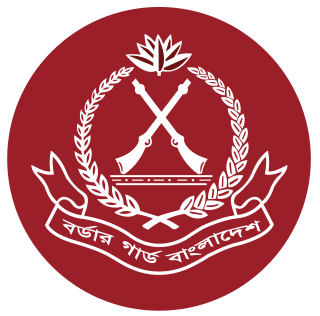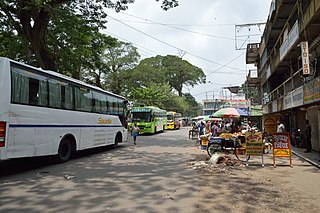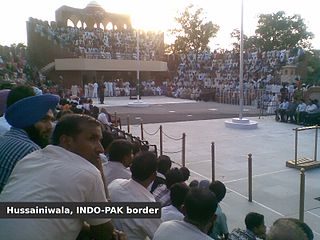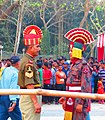
The Border Security Force (BSF) is India's border guarding organisation at its borders with Pakistan and Bangladesh. It is one of the five Central Armed Police Forces (CAPF) of India, and was formed in the wake of the Indo-Pakistani War of 1965 "for ensuring the security of the borders of India and for connected matters therewith".

The Border Guard Bangladesh (BGB) is a paramilitary force responsible for the border security of Bangladesh. The BGB is entrusted with the responsibility to defend the 4,427 kilometres (2,751 mi) border of Bangladesh with India and Myanmar. It was formerly known as the Bangladesh Rifles (BDR).

Wagah, also spelled Wagha, is a village and union council located in the WahgaZone near Lahore City District, Pakistan. The town is famous for the Wagah border ceremony and also serves as a goods transit terminal and a railway station between Pakistan and India. Wahga is situated 600 metres (2,000 ft) west of the border and lies on the historic Grand Trunk Road between Lahore and Amritsar in India. The border is located 24 kilometres (15 mi) from Lahore and 32 kilometres (20 mi) from Amritsar. It is also 3 kilometres (1.9 mi) from the bordering village of Attari, India. The Wagah ceremony takes place every evening.

Bangladesh–India relations are the bilateral relations between the People's Republic of Bangladesh and the Republic of India, both of which are South Asian neighbours. Diplomatic relations between the two countries formally began in 1971 with India's recognition of an independent Bangladesh following India helping Bangladesh secure its independence during the Bangladesh Liberation War against Pakistan. On 6 December, Bangladesh and India celebrate Friendship Day commemorating India's recognition of Bangladesh and the continued friendship between the two countries.

Petrapole is the Indian side of Petrapole-Benapole border checkpoint between India and Benapole of Bangladesh, on the Bangladesh-India border, near Bongaon in North 24 Parganas district of West Bengal. Petrapole border is the only land port in south Bengal. It is also the largest land customs station in Asia.
The Pakistan Rangers are a pair of paramilitary federal law enforcement corps' in Pakistan. The two corps are the Punjab Rangers and the Sindh Rangers. There is also a third corps headquarters in Islamabad but is only for units transferred from the other corps for duties in the federal capital. They are both part of the Civil Armed Forces. The corps' operate administratively under the Pakistan Army but under separate command structures and wear distinctly different uniforms. However, they are usually commanded by officers on secondment from the Pakistan Army. Their primary purpose is to secure and defend the approximately 2,200 km (1,400 mi) long border with neighbouring India. They are also often involved in major internal and external security operations with the regular Pakistani military and provide assistance to municipal and provincial police forces to maintain law and order against crime, terrorism and unrest. In addition, the Punjab Rangers, together with the Indian Border Security Force, participate in an elaborate flag lowering ceremony at the Wagah−Attari border crossing east of Lahore. The mutually-recognized India–Pakistan international border is different from the disputed and heavily militarized Line of Control (LoC), where the Pakistani province of Punjab adjoins Jammu and Kashmir and the undisputed international border effectively ends. Consequently, the LoC is not managed by the paramilitary Punjab Rangers, but by the regular Pakistan Army.

The India–Pakistan, Indo–Pakistani or Pakistani-Indian border is the international boundary that separates the nations of the Republic of India and the Islamic Republic of Pakistan. At its northern end is the Line of Control, which separates Indian-administered Kashmir from Pakistani-administered Kashmir; and at its southern end is Sir Creek, a tidal estuary in the Rann of Kutch between the Indian state of Gujarat and the Pakistani province of Sindh.

Fazilka, also known as Bangla, is a city and a municipal council in Fazilka district of Punjab, India. In 2011, it was made the headquarter of the newly created Fazilka district. The Trans-Afghanistan Pipeline (TAPI) project originating in Turkmenistan will have its last station in Fazilka.

Hussainiwala is a village near Firozpur city in Firozpur district in Punjab state, India. It lies near the bank of the Sutlej river. The village is on the border with Pakistan, opposite the Pakistani village of Ganda Singh Wala. It is a border crossing between India and Pakistan that is currently closed, however a daily joint beating retreat border ceremony is held by the two nations. The village is popular for the Hussainiwala National Martyrs Memorial.

The 2001 Bangladesh–India border clashes were a series of armed skirmishes between India and Bangladesh in April 2001. The clashes took place between troops of the Bangladesh Rifles (BDR) and the Indian Border Security Force (BSF) on the poorly-marked international border between the two countries.

The Bangladesh–India border, known locally as the Radcliffe line (IB), is an international border running between the republics of Bangladesh and India that demarcates the eight divisions of Bangladesh and the Indian states.
Gede is the last railway station on the Indian side of the Bangladesh–India border in Krishnaganj CD Block in Nadia district in the Indian state of West Bengal. The corresponding station on the Bangladesh side is Darshana. It is the terminal station on the Sealdah–Gede section of Kolkata Suburban Railway system. There is a border checkpoint at Gede.

The lowering of the flags ceremony at the Attari–Wagah border is a daily ceremony that the security forces of India and Pakistan have jointly followed since 1959. The drill is characterized by elaborate and rapid dance-like manoeuvres and raising legs as high as possible, which have been described as "colourful". It is both a symbol of the two countries’ rivalry, and a display of brotherhood and cooperation between the two nations.
Deaths along the Bangladesh–India border occur many times a year as result of people attempting to illegally cross into India from Bangladesh, for walking along the border, cross border firing and cattle smuggling. Bangladesh and India share a 4,096 kilometer border. To prevent smuggling and illegal migration from Bangladesh, the Indian Border Security Force exercises its controversial "Shoot-on-sight" policy. Under this policy, the BSF can shoot any person on site with or without cause. A large portion of the victims are cattle traders and farmers with land near the border. Brad Adams, stated that, "Routinely shooting poor, unarmed villagers is not how the world's largest democracy should behave."
The Republic of India shares borders with several sovereign countries; it shares land borders with China, Bhutan, Nepal, Pakistan, Bangladesh and Myanmar. Bangladesh Myanmar and Pakistan share both land borders as well as maritime borders, while Sri Lanka shares only a maritime border through Ram Setu. India's Andaman and Nicobar Islands share a maritime border with Thailand, Myanmar, and Indonesia.

The Indian military bands consists of musicians from the Indian Army, Navy and Air Force. Indian military bands regularly participate in international festivals and take part in celebrations dedicated to various national events. These bands are permanent participants in the Delhi Republic Day parade on the Kartavya Path. Today, the Indian Armed Forces have more than 50 military brass bands and 400 pipe bands and corps of drums. A Tri-Services Band refers to a joint Indian Armed Forces military band that performs together as a unit. At the Spasskaya Tower Military Music Festival and Tattoo in Moscow, the band consisted of 7 officers and 55 musicians. The Military Music Wing of the Army Education Corps is the principal educational institution of the armed forces that provides instruction to musicians of all ranks. Instruction is also provided by the Military Music Training Center and the Indian Navy School of Music.

The Sealdah–Bangaon line is a 78 km (48 mi) long broad gauge railway line that connects the Sealdah Main and North terminus of Kolkata with Bangaon of North 24 Parganas district of West Bengal, India. Once a part of the old Calcutta–Jessore–Khulna line, today it is a busy suburban section of the Kolkata Suburban Railway's Sealdah North section. It is under the jurisdiction of the Sealdah railway division of the Eastern Railway zone of the Indian Railways.

The Benapole Border Crossing also known as the Petrapole Crossing is an international border crossing between Benapole, Jessore, Bangladesh, and Petrapole, North 24 Parganas, West Bengal, India.

Petrapole railway station is a railway station of the Indian Railways located in the North 24 Parganas district, West Bengal. Its station code is PTPL. It is located near the Indo-Bangladesh border and serves as a major border crossing point for freight trains to Bangladesh, with Benapole being the Bangladesh Railways counterpart.
Nadabet, also known as the 'Wagah of Gujarat', is a border location in Gujarat, India, developed as a tourist destination by the Gujarat Tourism Department. It is known for the Seema Darshan Project, a state-of-the-art initiative by the Border Security Force (BSF) to promote border tourism.
























